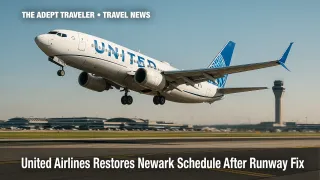United Airlines Restores Newark Schedule After Runway Fix

United Airlines Newark operations have bounced back just six weeks after runway construction and air-traffic limits forced steep flight cuts. The carrier now runs about 380 daily departures-only a handful below last summer's peak-and expects no significant impact when weekend closures resume on runway 4L-22R from September through December. Executives credit tighter coordination with the Federal Aviation Administration, 24-hour construction shifts, and targeted frequency trims on high-volume leisure routes.
Key Points
- Runway 4L-22R reopened June 2-12 days early-after round-the-clock work.
- United reduced 35 daily flights in May, then restored most service by late June.
- FAA caps of 68 movements per hour remain in place until October 25.
- Why it matters: Newark Liberty is United's busiest East Coast hub, moving one in seven system passengers.
- Weekend runway closures this fall are expected to cause "no operational impact," the airline says.
Snapshot
Newark Liberty International Airport (EWR) handles more than 400,000 United departures a year, linking the New York metropolitan area with 160 cities worldwide. Construction on primary departure runway 4L-22R began in April, shrinking usable pavement and pushing the FAA to set hourly movement caps-first 56, then 68. United pre-emptively trimmed 35 flights a day, focusing on frequency-rich leisure markets such as Orlando, Las Vegas, Washington, D.C., and Boston. By cutting duplicates rather than single-daily spokes, the airline shielded smaller communities from service loss and preserved key business timings.
Background
Runway renovations coincided with a late-April outage in Newark's terminal automation system that slowed controller workload. Several controllers subsequently took leave, leaving the tower short-staffed just as pavement removal reached its most disruptive phase. Delays spiked; on May 2 United Chief Executive Scott Kirby ordered immediate schedule relief. The U.S. Department of Transportation, the Port Authority of New York and New Jersey, and construction crews shifted to 24-hour work, shaving nearly two weeks off the timeline. The runway reopened for departures June 2, and United quickly re-added flights, reaching 380 daily departures by June 26-only 15 below last summer's 395. July schedules sit just 3 percent under year-ago levels, with capacity down 1 percent.
Latest Developments
United's operations team insists the next construction phase-overnight weekend closures from September through December-will be invisible to travelers. Three initiatives underpin that confidence.
Temporary Flight Reductions Conclude
With pavement restored, United reversed May's 35-flight cut, lifting daily departures from 293 back to roughly 380. The carrier says further add-backs hinge on whether the FAA lifts its 68-movement cap after October 25 or converts Newark into a Level 3 slot-controlled airport, a status that lapsed in 2016.
Runway Work Ahead
Runway 4L-22R will close most Saturday nights this fall for lighting and surface finishing. United already runs lighter evening schedules on Saturdays, allowing work windows without fresh cancellations. Airport crews will reopen the strip by early Sunday, a pattern successfully tested during June's final punch-list repairs.
Customer Outreach Efforts
During the worst delays, United staged webinars, issued tailored email advisories to frequent flyers living near EWR, and hosted on-site tours of its control center for corporate travel managers. Feedback led to a standing program of monthly facility visits and real-time operational dashboards for key accounts.
Analysis
For travelers, the near-return to full schedule means restored seat inventory, tighter connection banks, and improved on-time performance. Corporate clients regain nonstop options that disappeared briefly in May, while leisure passengers regain flexibility on Florida and Nevada routes. The lingering FAA cap still constrains peak-hour availability, so premium fares may persist on early-morning departures until at least late October. If Newark regains Level 3 status, slot discipline would spread reductions across all airlines, likely stabilizing delays but limiting opportunistic growth by competitors. Conversely, lifting caps without slots risks renewed congestion next summer. Travelers booking holiday or business trips should monitor weekend runway bulletins, but United's overnight work plan suggests minimal schedule volatility.
Final Thoughts
United Airlines Newark operations have largely rebounded, providing travelers with near-normal choice just weeks after drastic springtime cuts. Continued construction cooperation and transparent customer communication should keep fall weekend work from eroding reliability. Passengers can book with confidence while watching for news on post-October FAA decisions that will shape United Airlines Newark operations in 2026 and beyond.
